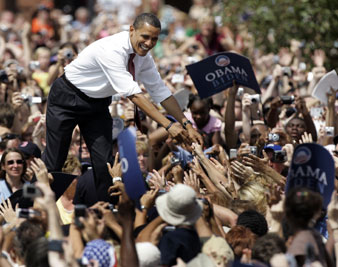 AP Images
AP Images
Think of the convention as a series of circles. At the center is the bull’s-eye–the convention itself, the delegates assembled at the Pepsi Center, where the public action takes place.
Among the circles, there are the funders (one of whom complained to me that “there is plenty of money at this convention–enough to make the difference in, say, twenty close Congressional races. The problem is, there are more than seventy-five close Congressional races, and there’s no real forum here to work out a strategy on who gets what”).
There are the protesters in the streets (some of whom were pepper-sprayed yesterday, outside the Sheraton Hotel where the New York delegation is staying, although it’s still unclear who was protesting what).
There are the lobbyists (not all of them evil) with their receptions and free-flowing booze (like Planned Parenthood’s “Sex, Politics, Cocktails Late-Night Dance Party”).
There are the journalists (to be found, of course, at the nearest bar–the Ship Tavern in the Brown Palace hotel, opposite the Comfort Inn, where The Nation has put some of us up, isn’t bad).
And then there are the policy wonks, who seem to appear at round-the-clock symposia on issues ranging from “Health Care, Not Warfare” to an afternoon of “Ideas on election 2008,” in this case co-sponsored by Air America and Progressive Book Club, at a venue called The Big Tent.
“It’s not left versus right,” said Thom Hartmann, who hosts a show on Air America and was moderating a panel called “The Contest: Progressives vs. Conservatives.” “The left is dead. I interviewed the head of the Communist Party and it only has 312 members. It’s all-of-America vs. right-wing cranks.” Arianna Huffington put it slightly differently: “It’s not left versus right because left positions [like universal healthcare, global warming] are now mainstream positions. The problem is with the media, which presents ‘all sides’ when often there is only one side.” David Sirota, author of The Uprising, argued that the key to electoral victory is realizing that “to harness all the energy out there, you have to deal with what pisses people off. Deregulation and NAFTA–which both parties are responsible for–have made ordinary people angry. You have to force the party to take progressive positions.”
I agree with all of the above. But I also believe that Barack Obama, who ran a brilliant, bottom-up primary campaign, is so far making a big post-primary mistake. And it doesn’t have to do with ideological flip-flops (like not fulfilling his promise to filibuster the FISA bill that gave legal immunity to telecommunications companies who facilitated illegal government eavesdropping, “refining” his position on Iraq, and such). Although the list is too long, he can justify each of these decisions case by case.
His mistake is the same one that the last two Democratic candidates for President–Gore and Kerry–made. The assumption (shared by too many campaign consultants) that the way to woo those in the center is to move towards the center. Arianna Huffington, I believe, has a point when she advises, “Instead of targeting the swing voters he should target the unlikely voters.” But I would argue there’s nothing wrong with targeting the swing voters. What’s wrong is to pander to them on the assumption that the way to win them over is to move towards the center.
The reason they are undecided is precisely because they are not Democrats or Republicans, and they don’t care about left vs. right. They care about finding someone they can connect with, a candidate they can trust. And as soon as they see a candidate who appears to be listening to his consultants and pollsters rather than being true to himself, they see a candidate who has betrayed what they care about most: authenticity.
Because this is so clearly a Democratic year, Obama may well win even if he persists in traveling down the illusory middle. But if that’s the way he wins, it will be too bad, because he will be a President without a mandate–or with, at best, a diluted one.


